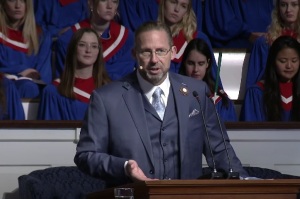Robert Jeffress: There Are '75 Million Radical Muslims in the World' Today

Dallas megachurch Pastor Robert Jeffress says there are as many as 75 million radical Muslims in the world today, and claims that number is a conservative estimate.
Jeffress, who is the outspoken senior pastor at the 12,000-member First Baptist Church, told Lou Dobbs during an interview on Fox Business Wednesday that 5 percent or more of the Earth's 1.5 billion Muslims are embracing radical Islam.
After criticizing President Barack Obama over his refusal to identify radical Islam as being the "common denominator" behind recent terror attacks in Pakistan, Brussels, Paris and San Bernardino, Jeffress praised Republican presidential frontrunner Donald Trump for his assertion in early March that "Islam hates us."
"I think we are seeing what Donald Trump said a few weeks ago as being absolutely true," Jeffress said. "There is something within Islam that is engendering this hatred toward the rest of the world."
Jeffress, who has appeared at a number of Trump campaign rallies this election cycle, praised both Trump and his Republican campaign opponent Texas Sen. Ted Cruz for introducing immigration plans that are "designed to ensure the security of our country."
"Let's be clear, we realize that maybe just 5 percent of the 1.5 billion people in the world, or 1.5 billion Muslims in the world embrace radical Islam," Jeffress stated. "Lou, that's 75 million radical Muslims in the world."
"You don't have that with Christianity — 2.2 billion Christians in the world — we don't have 100 million Christians running around trying to chop people's heads off or bomb and maim, and I think Trump is telling the politically incorrect truth that needs to be told."
Jeffress told The Christian Post on Thursday that he came up with that "5 percent" figure through research he did for his 2015 book, Countdown to the Apocalypse.
"I found estimates ranging from 5 percent to 15 percent of Muslims who are thought to embrace some form of 'radical Islam,'" Jeffress wrote in an email. "Of course, everything hinges on the meaning of 'radical Islam' — which could range from the imposition of Sharia law to suicide bombings. Based on my findings, I think 5 percent is a conservative number as [the linked] article illustrates."
Nina Shea, the director of the Hudson Institute's Center for Religious Freedom, told CP that Jeffress' 5 percent estimate is not far off from the estimates that she has heard.
"I have heard up to 10 percent of the [Muslim] population, that's what some people estimate," Shea explained. "But, that may only be people who are sympathetic with radical Islam, not willing to act on it. I have seen that 5 percent figure cited before in a secular piece working on the presumption that only 5 percent are actually willing to act on it."
Shea added that since the Iranian Islamic Revolution of 1979, "a radicalization" of the Muslim world has occurred and has led to a "race for influence" between Iran (Shia) and Saudi Arabia (Sunni).
"That has spread and you have seen pockets of the Muslim world becoming very, very extreme," She said.
Although many people might think of "radicals" as being just terrorists, impunity provided by strict conservative Muslim governments in Saudi Arabia, Iran, Pakistan and some African countries have led to numerous Muslims embracing societal violence against non-Muslims or apostates under the guise of Sharia law.
"You have got to throw out the terminology that is not accurate. There is no such thing as a radical Muslim. I would throw out any words that are modifiers — radicals, extremists, islamists," Clare Lopez, vice president for research and analysis at the Center for Security Policy, told CP. "The reason being, there is only one Islam. It is fixed, immutable, it's been so since the 10th century. Individual people obey or don't obey with greater or lesser fidelity."
Lopez explained that there is no real way to know how many Muslims in the world are truly "faithful toward Islam's call for jihad or Sharia law.
"You can be faithful by teaching your children to love Sharia [law] and jihad. You can be faithful by paying your annual zakat tax, which is obligatory to go to jihad. You can be faithful by speaking or writing or broadcasting, as well as picking up a bomb," Lopez said. "If the majority of ordinary, everyday Muslim moms and dads were not teaching their children to be faithful to Islam, to the law, to Sharia, to Allah, Islam probably wouldn't have 1.6 billion adherents today.
Lopez pointed out that a good resource to help get a feel for the number of Muslims who are truly "faithful" to Islam and Sharia law is by looking at Pew's 2013 survey of world Muslims.
The survey finds that in countries where Islam is the official religion, the percentage of Muslims who want Sharia law to become the official law of the land is extremely high.
In Afghanistan, 99 percent of Muslims favor making Sharia law the law of the land, while 91 percent of Iraqi Muslims favor such a move.
In South Asia, the median percent of Muslims who favor enshrining sharia law is 84 percent, while the median in Southeast Asia is 77 percent. Seventy-four is the median percent of Muslims who favor enshrining Sharia law in the Middle East and North Africa, while the median in Sub-Saharan Africa is 64 percent.





























